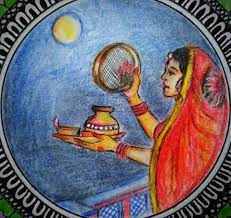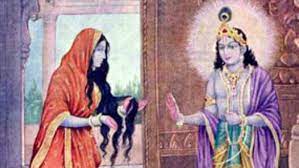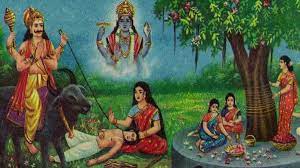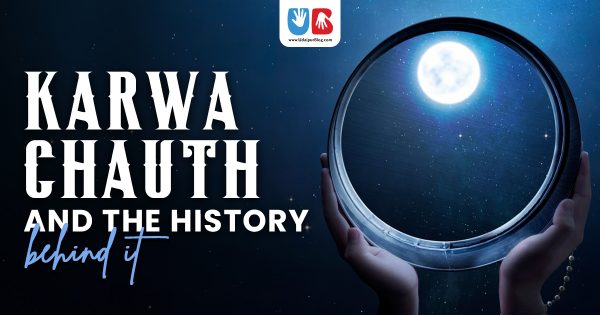Karwa Chauth is a one-day festival which is celebrated by all married women. On this festival, wives keep a fast from sunrise to moonrise for the safety and well-being of their husbands. Even though it is difficult to maintain a fast without drinking any water or eating anything throughout the day, devoted wives perform these rituals out of great love and respect for their husbands.
If we consider the term Karwa Chauth in its literal sense, it refers to the sacrifice of “Argya” to the moon on the Chaturthi of the Kartika month using an earthen pot known as a “Karwa.” Every year, the event takes place on the fourth day of the dark fortnight of the Kartika month. There are several anecdotes connected to this festival, even if its beginnings are still quite murky. Here are a few well-known Karwa Chauth tales that illustrate the significance of this festival:
Queen Veervati’s story

A beautiful queen named Veervati formerly reigned as the lone sibling of seven devoted and considerate brothers. She started a simple fast after sunrise on her first Karwa Chauth while staying with her parents. She was thirsty and hungry in the evening, and she was impatiently awaiting the moonrise. Her brothers were distressed to see her in such anguish. They created the illusion that the moon was in the sky by mounting a mirror in a peepal tree. As soon as Veervati broke her fast, she learned that her husband had passed away. She couldn’t stop crying and was devastated. She left right away for home, where she ran into Goddess Parvati. Maa Parvati admitted that her brothers had played a trap on her. She then observed the Karwa Chauth fast with complete devotion, and upon witnessing her commitment, Yama, the lord of death, brought her husband back to life. Women keeping the fast frequently hear this Queen Veervati Karva Chauth Katha, which is highly famous.
Queen Draupadi’s Karwa Chauth Story

Arjuna and Draupadi from the Mahabharata are the next Karva Chauth Kahani on our list. When Arjuna, the person Draupadi loved the most, decided to punish himself, he travelled to the Nilgiri mountains. The rest of the Pandava brothers were having trouble without him. In this circumstance, Draupadi asked Lord Krishna what should be done to address this problem. Then Lord Krishna narrated a story of Goddess Parvati, who performed the Karwa Chauth ceremonies. Therefore, Draupadi performed the severe Karwa Chauth fast for the well-being of her husband, and the Pandavas were able to find solutions to their issues.
Karwa’s Karwa Chauth Story
Karwa was a woman who was madly in love with her spouse and had many spiritual powers as a result of this passionate love. Once, when her husband went to take a bath in the river, a crocodile attacked him. Having remembered Yama, the Lord of Death, brave Karwa now bound the crocodile with cotton yarn. She prayed to Lord Yamraj, asking him to grant her husband life and the crocodile death. But Yamraj said he couldn’t. Then, Karwa threatened to curse Lord Yama and destroy Yamdev in return. Yamraj was extremely petrified of being cursed by such a dedicated and loving wife; hence, he sent the crocodile to hell and bought her husband back to life.
Even today, married ladies pray to Karva Mata for their husbands’ health and happiness, according to the Karva Chauth Kahani that was narrated.
Satyavan and Savitri’s Karwa Chauth Story

According to legend, Savitri pleaded for Satyavan’s life in front of Yama, the god of death, when he arrived to take his life. Yama insisted on taking away Savitri’s husband, despite the fact that she had quit eating and drinking and had followed Yama. Yama now told Savitri that she might request any other miracle, except the death of her husband. Due to her intelligence, Savitri asked Yama if he could bless her with bearing a child, which was something she desired. However, she would also not tolerate any form of betrayal because she was a dedicated and loyal wife. As a result, Yama had to give Satyavan life again so that Savitri might become pregnant.
Women and girls who are fasting on Karva Chauth day, make sure to hear Savitri’s Karva Chauth Katha. Additionally, hearing all the Karva Chauth tales highlights the significance of this fast and how old this festival is.
Why is Karwa Chauth Celebrated?
Given the aforementioned Karva Chauth stories, you might now be well aware of the significance that this event has in Hindu culture. This festival is more prominent in the northern and north-western parts of our country. The Indian Army soldiers and military officials made up a sizable portion of the male population in these areas; hence, the ladies in these areas began fasting for the safety of these real heroes. The women used to pray for the long lives of their husbands as they protected the nation from enemies.
In ancient times, women used to get married at the age of 10 to 13 in India. In such a marriage, they would not be able to enjoy their childhood or early adolescence. Additionally, communication was a major barrier back then. They, therefore, found it difficult to visit their parent’s houses, which was equally bad. Therefore, a woman had to take total responsibility for a new household from a young age. She was sent in charge of all the daily chores, including cooking and cleaning. But she was living in an unknown house alone, far from her loved ones, and she had no friends either. In times of loneliness or homesickness, where would she go?
Therefore, to address this issue, the women began to celebrate Karwa Chauth in a magnificent manner, where married women from the entire village as well as some of the neighbouring villages would gather in one location and spend the day in joy and laughter. They became friends and referred to one another as “God sisters” or “God friends.”
One could argue that the origin of this festival was a way for them to have fun and forget about being alone at their in-laws’ house. On this day, they celebrated their union and gave gifts to one another, such as sindoor, lipstick, and bracelets, to serve as a constant reminder that someone out there is always a friend.
Recently, husbands have begun to fast for their spouses as well. This act has added an extra specialness to the festival, as it represents compassion, love, and understanding on both sides.


